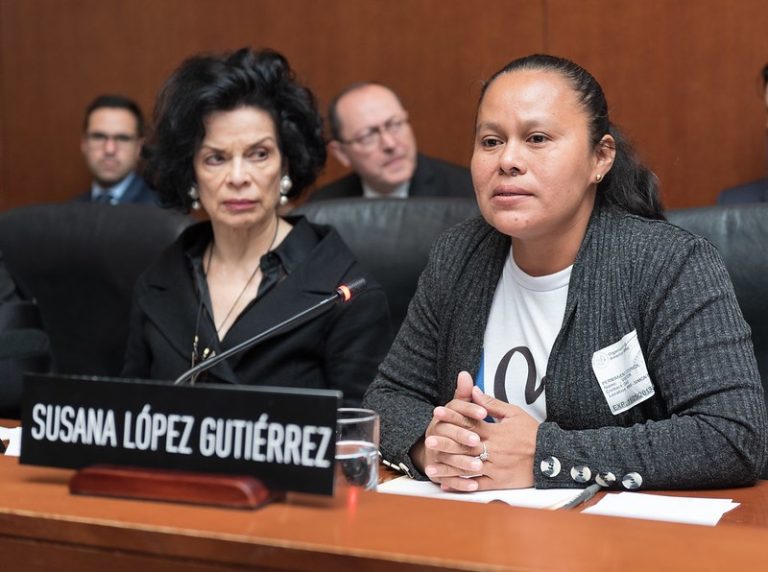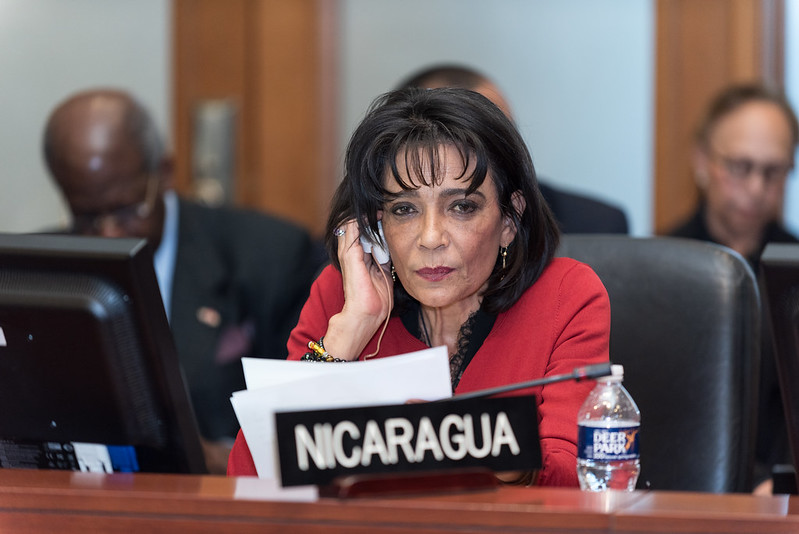29 de noviembre 2019

Children of Exile: The Births “Sowing Hope” in the Camp of Nicaraguan Farmers

PUBLICIDAD 1M
PUBLICIDAD 4D
PUBLICIDAD 5D
At least ten countries support the recommendation to “immediately” convene an extraordinary session of the General Assembly

The Permanent Council of the Organization of American States (OAS) heard once again about the abuses that the regime of Daniel Ortega and Rosario Murillo commits daily against opponents.
The Permanent Council of the Organization of American States (OAS) heard once again about the abuses that the regime of Daniel Ortega and Rosario Murillo commits daily against opponents. This time it was a presentation among colleagues: a High-Level Commission of the organization presented its final report on the crisis in Nicaragua.
The main conclusion of this Commission —made up by the representatives of Paraguay, Jamaica, United States, Canada and Argentina—, is that in Nicaragua there is an “alteration of constitutional order that seriously affects the democratic order,” for which it recommends that the Permanent Council convene “immediately” to an extraordinary session of the General Assembly, the highest instance of the OAS.
However, on the possibility of a General Assembly, no majority agreement was reached. Ten countries —United States, Canada, Costa Rica, Dominican Republic, Venezuela, Ecuador, Bolivia, Brazil, Argentina and Uruguay—, spoke in favor of holding an special session.
The recommendation to convoke the OAS General Assembly —in which the foreign ministers of all the countries participate—, is based on article 20 of the OAS Inter-American Democratic Charter, which was activated this year to address the crisis in Nicaragua.
The Ortega regime, through its representative Ruth Tapia, rejected the Commission’s accusations, whose report it described as “null” and “interference.”
“(The Commission) is non-existent, and something that does not exists cannot produce reports. We consider all of its actions as non-existent,” said Tapia.

Ruth Tapia, the representative of the Ortega government at the OAS Permanent Council.
The regime ignored the creation of the Commission and prohibited its members from entering Nicaragua. The diplomats were forced to meet in El Salvador and the US, with relatives of those killed by the Ortega massacre, released political prisoners, human rights and civil society organizations.
The report was presented by the representative of Jamaica, Audrey Marks, who emphasized that the Commission concluded that the dictatorship “has shown a continuous pattern of efforts aimed at curtailing the rights of citizens, for example: constant harassment and intimidation, restrictions on political rights, freedom of the press, freedom of expression, the right to personal freedom and of humane treatment.
Guests at the session of the Permanent Council included Antonia Urrejola, Special Rapporteur for Nicaragua of the Inter-American Commission on Human Rights (IACHR), who—by video conference—stressed that in the country human rights violations “continue.” “In the last month there has been a special focus on persecution against families of the victims. What is happening in Nicaragua is hard to believe.”
The testimonies of some former political prisoners and relatives of fatal victims were also heard. Among them: former prisoner and protest leader Edwin Carcache, Veronica Ordonez, wife of political prisoner Pedro Gutierrez; Francis Valdivia, sister of Franco Valdivia, university student killed in Esteli, Susana Lopez, mother of Gerald Vasquez, a university student murdered in Managua.
In addition, also given the microphone was Nicaraguan human rights activist, Bianca Jagger; the executive director of the national organization “Etica y Transparencia” (ET- Ethics and Transparency), Roberto Courtney; and the Nicaraguan Manuel Orozco, researcher of the Inter-American Dialogue, a think-tank based in Washington, United States.
In their report, diplomats recommended the return to Nicaragua of human rights organizations, expelled by the dictatorship. They particularly referred to the Special Monitoring Mechanism for Nicaragua (Meseni) and the Office of the United Nations High Commissioner for Human Rights (OHCHR).
Article 20 of the Democratic Charter states that the Assembly shall adopt “the decisions that it deems appropriate, including diplomatic efforts, in accordance with the Charter of the Organization, international law and the provision of this Democratic Charter.”
Experts told Confidencial that if a special session of the Assembly is convened, there is no guarantee that the OAS will apply article 21 of the Democratic Charter to the regime. This establishes the suspension of a country from the organization, when it has confirmed that “there has been an interruption of the democratic order of a member state, and that diplomatic initiatives have failed.”
The suspension requires the votes of 24 countries, of the 34 in the OAS, an amount that does not yet exist, according to diplomatic sources. Voting against the regime on resolutions has never exceeded 22 votes, so they consider it remote and improbable that opposition nations (to the regime) and the Secretary General of the Organization, Luis Almagro, will venture into a voting process, leaving them to insist on “diplomatic efforts.”
The OAS has only suspended two countries: Cuba in 1962, three years after the revolution led by Fidel Castro; and Honduras in 2009, after the coup d’état against President Manuel Zelaya.
The suspension from the OAS would lead to problems in accessing funds from multilateral organizations such as the World Bank (WB) and the Inter-American Development Bank (IADB), while individual countries could sever diplomatic relations and suspend bilateral aid to Ortega.
Archivado como:
PUBLICIDAD 3M
Confidencial es un diario digital nicaragüense, de formato multimedia, fundado por Carlos F. Chamorro en junio de 1996.
PUBLICIDAD 3D